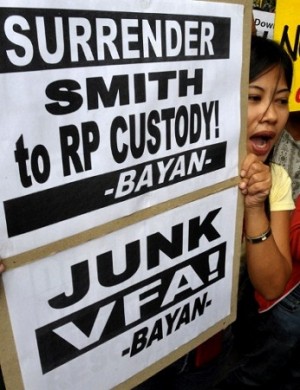Remember Daniel Smith?

Activists protest outside the US Embassy in Manila on February 12, 2009, demanding that it order the imprisonment of US Marine Lance Corporal Daniel Smith, convicted in 2006 to life in prison for the rape of a Filipina woman. AFP FILE PHOTO
MANILA, Philippines—Noting that the new defense deal is silent on jurisdiction over crimes involving American servicemen, some analysts urged Congress to scrutinize the Enhanced Defense Cooperation Agreement (Edca) with a view to scrapping it.
Romulo “Bobby” Tuazon, a political science professor at the University of the Philippines Manila, said the agreement granted extraterritorial rights to Americans because of the “exclusivity of their domain” in “agreed locations.”
“No law can run after erring American personnel. You will not know what kind of activities they’ll be doing there,” Tuazon said in an interview.
“Even if the Philippines is given the right to access, that access is silent on whether it carries the right to inspect,” Tuazon said. “So any incident, event or activity that will violate Philippine laws, including local laws, this can’t be under investigation.”
Tuazon, director for policy study of the Center for People Empowerment in Governance, said: “This is an agreement between a superpower and a weakling. From that vantage point, how can you assert sovereignty, as was the case of Smith?”
Marine Lance Cpl. Daniel Smith was tried for the 2005 rape of a Filipino woman. He was sprung from the Makati City jail in the dead of the night and confined at the US Embassy, prompting calls for the abrogation of the Visiting Forces Agreement.
The Court of Appeals later reversed a lower court that found Smith guilty and ordered his release.
Benito Lim, a political science professor at Ateneo de Manila University, agreed that the Edca was unclear on criminal jurisdiction.
“The issue of who has jurisdiction over American military personnel who commit crimes against the Philippines is very vague,” Lim said on the phone.—TJ A. Burgonio